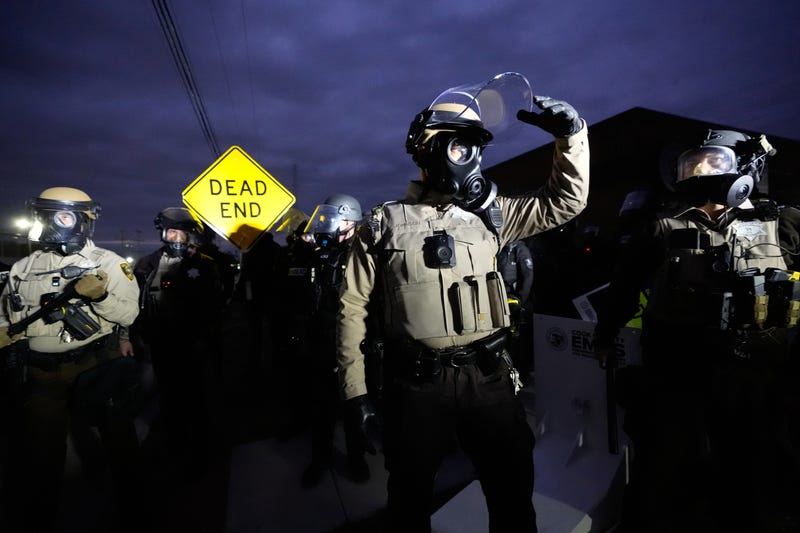
CHICAGO (AP) — Witnesses in a Chicago courtroom described Wednesday being hit with tear gas and claims by others that they were struck with rubber bullets and other objects as part of excessive force by authorities on protesters during demonstrations over the detainment of immigrants and federal immigration policies.
A federal judge is hearing testimony Wednesday during a preliminary injunction hearing in a lawsuit suit filed by news outlets and protesters.
Brendan Curran, a priest and co-founder of Priests for Justice for Immigrants, testified that he prayed for many years in front of a U.S. Immigration and Customs Enforcement facility in Broadview, a suburb of Chicago, but that the area now has become an “utterly militarized zone.”
U.S. District Judge Sara Ellis has already ordered agents to wear badges and banned them from using certain riot-control techniques, such as tear gas, against peaceful protesters and journalists. After repeatedly chastising federal officials for not following her previous orders, she added a requirement for body cameras.
Ellis will weigh how to respond to allegations that federal immigration agents in the Chicago area have used excessive force, following a surge of recent court filings detailing tense encounters between agents and local residents.
Curran said high school and college students often would pray outside the Broadview facility in solidarity with detained immigrants until deciding it no longer was “a safe place.”
“There were snipers on the corners of the roof,” Curran said. “I have many loved ones around the country and they still don’t believe what I’m describing.”
The courtroom grew tense as Justice Department lawyer Sarmad Khojasteh challenged whether Curran actually saw people being shot by tear gas.
“I observed federal agents launching projectiles from the corner of the roof at the people who were not armed and not violent in any way,” Curran responded, before describing his eyes and nose watering after he was tear gassed.
Chicago Newspaper Guild Executive Director Emily Steelhammer also took the stand, recounting how members of the union said they were hit with rubber bullets, pepper balls and chemical weapons, including tear gas. The incidents mostly occurred in Broadview, but also took place at other Chicago-area demonstrations, she said.
“Our journalists have been very careful about identifying themselves as press,” Steelhammer testified.
She added that they have not disobeyed law enforcement commands, but have expressed concerns that agents haven’t given dispersal orders before deploying chemical agents.
Craig Futterman, a lawyer for the plaintiffs, noted recent examples of agents using tear gas on Chicago-area residents, including at a Halloween parade and outside a grocery store. He said senior Border Patrol official Greg Bovino, himself, has been filmed throwing tear gas canisters at protesters.
But Khojasteh accused many protesters of threatening to kill law enforcement officers, impeding their duties and throwing rocks and other objects at agents.
“Such conduct must be rejected,” he said. “To what extent does the freedom of speech protect individuals in obstructing and/or threatening conduct — throwing rocks, bottles, fireworks, surrounding and pinning down law enforcement officials?”
The hearing comes after Ellis questioned Bovino at a public hearing last week, where she took the rare step of ordering him to brief her each evening on the federal immigration crackdown in Chicago. That move was swiftly blocked by an appeals court.
On Tuesday, Bovino appeared in court yet again for a deposition — a private interview — with lawyers from both sides. Parts of the videotaped deposition will be played in court Wednesday, according to court filings.
Court filings released late Monday night shed light on a previous deposition by Bovino in which he acknowledged tossing tear gas and being hit by a rock in the predominantly Mexican American neighborhood of Little Village last month. Bovino also testified that he has “instructed his officers to arrest protesters who make hyperbolic comments in the heat of political demonstrations," court records show.
Meanwhile, a federal judge is expected to rule Wednesday afternoon after a group of detainees filed a class-action lawsuit against federal authorities, alleging “inhuman” conditions at a Chicago-area immigration facility.
On Tuesday, U.S. District Judge Robert Gettleman called the alleged conditions “unnecessarily cruel” after hearing people held at the facility detail overflowing toilets, crowded cells, no beds and water that “tasted like sewer.” He called for the hearing to reconvene at 4:15 p.m. local time Wednesday so that he can issue a temporary restraining order to address the conditions.